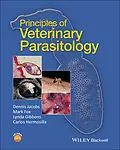Principles of Veterinary Parasitology
Principles of Veterinary Parasitology is a student-friendly introduction to veterinary parasitology. Written primarily to meet the immediate needs of veterinary students, this textbook outlines the essential parasitological knowledge needed to underpin clinical practice. Conceptual relationships between parasitic organisms, their biology and the diseases they cause are clearly illustrated. Help boxes and practical tips are included throughout alongside a wealth of colour photographs, drawings and life-cycle diagrams. Organised taxonomically with additional host-orientated chapters and focussing on parasites that commonly cause animal or zoonotic disease, welfare problems or economic losses, students worldwide will benefit from this straightforward and easy to comprehend introduction to veterinary parasitology.
KEY FEATURES
* An easy to navigate textbook, providing information essential for clinical studies
* Full colour throughout, with photographs, diagrams, life-cycles and help boxes for visual learners
* A companion website including a pronunciation guide, self-assessment questions and further reading lists
This book is accompaines by a companion website:
WWW.wiley.com/go/jacobs/principles-veterinay-parasitology
The website includes:
* Glossary
* Parasites listed by host and body system
* Pronunciation guide
* Parasite recogonition: flease, flies,worms and worm eggs
* Revision questions and answers
* Further reading list: books, articles and websites
* Powerpoint files of all diagrame for downloading
Autorentext
ABOUT THE AUTHORS
Dennis Jacobs, BVMS, PhD, FHEA, DipEVPC, FRCPath, FRVCS, Emeritus Professor, The Royal Veterinary College, London
After graduating from the Glasgow Veterinary School and a short period in the pharmaceutical industry, he devoted his professional career to teaching and research. He has served as Vice-President of the World Association for the Advancement of Veterinary Parasitology and Secretary of the European Veterinary Parasitology College.
Mark Fox, BVetMed, PhD, FHEA, DipEVPC, MRCVS, Professor of Veterinary Parasitology, The Royal Veterinary College, London
He has over thirty years' experience of teaching and research in the veterinary parasitology field, having graduated from The Royal Veterinary College and spent a period in small animal practice. His current research interests focus on the epidemiology of parasite infections in both domestic and wild animals. He was awarded the William Hunting medal in recognition of avian coccidiosis research.
Lynda Gibbons, BSc, PhD, CBiol, FSB, Attached Senior Scientist, The Royal Veterinary College, London
Having studied at Leicester University and the London School of Hygiene and Tropical Medicine, she became Head of Animal Helminthology Biosystematics at the CABI Institute of Parasitology. She is a recipient of the Elsdon-Dew medal (Parasitological Society of Southern Africa) and the Betts Prize (The Royal Veterinary College).
Carlos Hermosilla, DrMedVet, DipEVPC, DrHabiI, DVM, Professor, Justus-Liebig-Universität Giessen
Having gained a veterinary degree from the University Austral of Chile, and doctorates from Justus-Liebig-Universität in Germany, he worked as Senior Lecturer in Veterinary Parasitology at The Royal Veterinary College, London, before returning to the Institute of Parasitology in Giessen as Professor to continue his enthusiasm for teaching and research. He is also visiting professor at the University Austral of Chile.
Klappentext
Principles of Veterinary Parasitology is a student-friendly introduction to veterinary parasitology. Written primarily to meet the immediate needs of veterinary students, this textbook outlines the essential parasitological knowledge needed to underpin clinical practice. Conceptual relationships between parasitic organisms, their biology and the diseases they cause are clearly illustrated. Help boxes and practical tips are included throughout alongside a wealth of colour photographs, drawings and life-cycle diagrams. Organised taxonomically with additional host-orientated chapters and focussing on parasites that commonly cause animal or zoonotic disease, welfare problems or economic losses, students worldwide will benefit from this straightforward and easy to comprehend introduction to veterinary parasitology.
KEY FEATURES
- An easy to navigate textbook, providing information essential for clinical studies
- Full colour throughout, with photographs, diagrams, life-cycles and help boxes for visual learners
- A companion website including a pronunciation guide, self-assessment questions and further reading lists
This book is accompaines by a companion website:
WWW.wiley.com/go/jacobs/principles-veterinay-parasitology
The website includes:
- Glossary
- Parasites listed by host and body system
- Pronunciation guide
- Parasite recogonition: flease, flies,worms and worm eggs
- Revision questions and answers
- Further reading list: books, articles and websites
- Powerpoint files of all diagrame for downloading
Zusammenfassung
Principles of Veterinary Parasitology
Principles of Veterinary Parasitology is a student-friendly introduction to veterinary parasitology. Written primarily to meet the immediate needs of veterinary students, this textbook outlines the essential parasitological knowledge needed to underpin clinical practice. Conceptual relationships between parasitic organisms, their biology and the diseases they cause are clearly illustrated. Help boxes and practical tips are included throughout alongside a wealth of colour photographs, drawings and life-cycle diagrams. Organised taxonomically with additional host-orientated chapters and focussing on parasites that commonly cause animal or zoonotic disease, welfare problems or economic losses, students worldwide will benefit from this straightforward and easy to comprehend introduction to veterinary parasitology.
KEY FEATURES
- An easy to navigate textbook, providing information essential for clinical studies
- Full colour throughout, with photographs, diagrams, life-cycles and help boxes for visual learners
- A companion website including a pronunciation guide, self-assessment questions and further reading lists
This book is accompaines by a companion website:
WWW.wiley.com/go/jacobs/principles-veterinay-parasitology
The website includes:
- Glossary
- Parasites listed by host and body system
- Pronunciation guide
- Parasite recogonition: flease, flies,worms and worm eggs
- Revision questions and answers
- Further reading list: books, articles and websites
- Powerpoint files of all diagrame for downloading
Inhalt
About the authors ix
Foreword x
Preface xi
Acknowledgements xii
List of abbreviations xiv
About the companion website xv
1 Veterinary Parasitology: basic concepts 1
1.1 Introduction 1
1.1.1 What is Veterinary Parasitology? 2
1.2 Parasitism and parasites 2
1.2.1 Parasitism 2
1.2.2 Classification 3
1.2.3 Host-parasite relationships 4
1.3 Host-parasite interactions 6
1.3.1 Host defences 6
1.3.2 Parasite evasion of immunity 9
1.4 Parasitic disease 10
1.4.1 The host-parasite balance 10
1.4.2 Why parasites are important 10
1.4.3 Pathogenic mechanisms 11
1.5 Diagnostic techniques 12
1.5.1 Direct detection methods 12
1.5.2 Indirect detection methods 13
1.5.3 Limitations 16
1.6 Treatment a…
